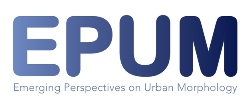InterActions_ Initiating Collaborative Blended Learning in Urban Form Studies – EPUM event- 03.09.2020

This online event aims to critically reflect on the outcomes of EPUM in relation to collaborative approaches to urban form studies (both in research and in teaching), facilitated by blended learning environments. It takes place in one of the lobby sessions of ISUF2020 online conference (http://isuf2020.cap.utah.edu/portal/)
Venue (Zoom link): https://us02web.zoom.us/j/9392739917
Time: 12:00 – 13:50 Salt Lake time (7pm London time; 9pm Nicosia time)
PRESENTERS:
· Ivor Samuels, School of Geography, Earth and Environmental Sciences, University of Birmingham
· Sam Griffiths, Bartlett School of Architecture, University College London
· Laura Narvaez Zertuche, Foster and Partners
· Zhan Ye, National University of Singapore
· Vitor Oliveira, University of Porto
· Giuseppe Strappa, Sapienza University
DISCUSSANTS:
Kayvan Karimi, Bartlett School of Architecture, University College London
Sabine Knierbein, Technical University of Vienna
Ilaria Geddes, University of Cyprus
CHAIR:
Nadia Charalambous, University of Cyprus
We will discuss Collaborative Learning Activities (CLAs) developed between different institutions, teachers and urban form approaches, in an attempt to eliminate research and institutional barriers in educational cultures by providing shared learning spaces and by making available resources accessible not only to those enrolled in higher education programmes, but to anyone wanting to access them regardless of their geographical location.


